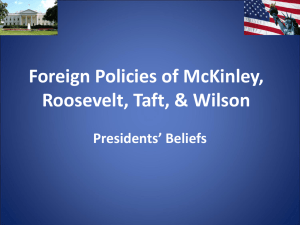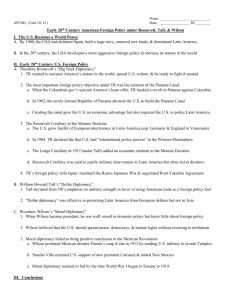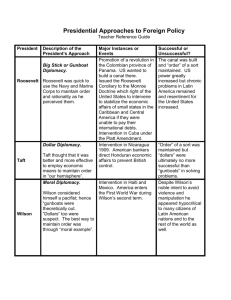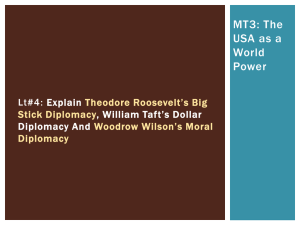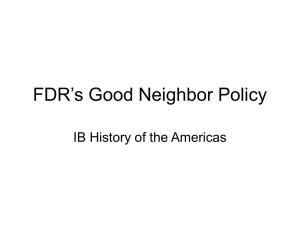Dollar, Moral, Good Neighbor
advertisement
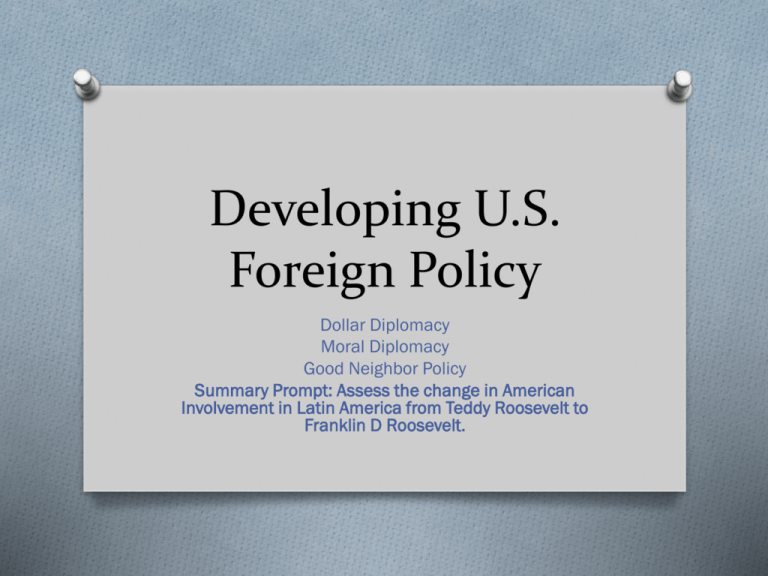
Developing U.S. Foreign Policy Dollar Diplomacy Moral Diplomacy Good Neighbor Policy Summary Prompt: Assess the change in American Involvement in Latin America from Teddy Roosevelt to Franklin D Roosevelt. “Constable of the World ” Neocolonialism O Neocolonialism (1880- 1930) Independent Latin American nations experienced military intervention, economic and cultural influence from GB, FR, and the U.S. Discussion O To what extent are neocolonialism and imperialism related? Taft and Dollar Diplomacy ■ After TR President Taft continued an aggressive foreign policy, called “Dollar Diplomacy” – Use U.S. wealth rather than military strength in foreign policy – In Latin America, U.S. banks assumed debts to Europe White board: What is a conclusion you can make from the graphs Moral Diplomacy ■ President Woodrow Wilson ■ Support nations with similar moral beliefs as the US (DEMOCRACY) ■ Moral Diplomacy could bring peace & democracy to the world without militarism & war ■ Punish those nations with different beliefs ■ Wilson talked of “human rights” in Latin America, but defended the Monroe Doctrine & intervened more than Roosevelt or Taft In 1913, Victoriano Huerta Took Power in Mex by force Moral Diplomacy Mexicoa fair US refused recognize Huerta &in demanded election Huerta refused, Wilson used minor incidents (arrest of some U.S. sailors in Tampico) to send the military to occupy Veracruz: Huerta Mexican rebel Pancho Villa raided a US Border Town Because the US supported his rival Carranza Wilson responded by sending the military to find Villa (who were unable to do so) WWI Started White Board O How did Moral Diplomacy play a role in justifying US intervention in Mexico: O Respond in 5 or less words Hoover’s Good Neighbor Policy O Hoover wanted to improve relations with Latin America O US criticized for armed interventions in Haiti and Nicaragua. O Improved by removing troops from Nicaragua O U.S. relations with Latin America were low. The Clark Memorandum 1930 O Rejects idea Roosevelt Corollary(right to intervene) O primary purpose of Monroe Doctrine was to protect Latin American from European powers, O not to victimize or oppress Latin American nations Discussion O Based on the information, what does the illustration represent? FDR’s Good Neighbor Policy O In President Franklin Roosevelt's inaugural address, he also promised to improve relations with Latin America by stating: O FDR’s Sec. of State, Cordell Hull O Ensure non-hostile neighbors in Latin America O Latin American cooperation in the WWII O Oil and Natural Resources. Discuss the key points in this quote of FDR O "In the field of world policy, I dedicate this nation to the policy of the good neighbor — the neighbor who resolutely respects himself and, because he does so, respects the rights of others." FDR’s Good Neighbor Policy O Under Hulls O Low tariffs improved the economies of the Latin American especially for Cuban sugar. O 1933 US committed to a policy of non-intervention into the affairs of Latin American countries. O Example: U.S. Marines were removed from Haiti in 1934 O Approve Treaty with Cuba nullify Platt Amendment Other Examples of Good Neighbor Policies O Hull obtained a united front against possible Axis aggression. O The U.S. did not intervene when Mexico nationalized oil and sent out foreign oil companies. O After WWII Latin American countries to join the Organization of American States (OAS) Part of the UN (largely controlled by the U.S.) White Board O Contrast FDR intervention in LA to those of T R. End of Good Neighbor Policy O The Good Neighbor Policy was abandoned After WWII O US ignored free trade deals O Viewed LA as supplier raw materials and tropical foodstuffs. O Increased intervention with Anti- Communist goals

